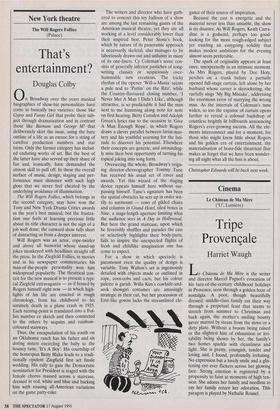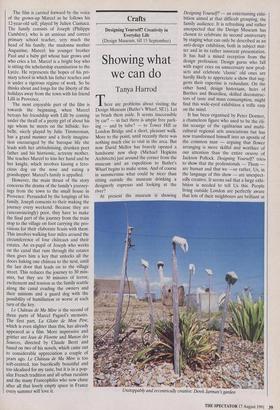Cinema
Tripe Provencale
Harriet Waugh
Le Château de Ma Mere is the writer and director Marcel Pagnol's evocation of his turn-of-the-century childhood holidays in Provence, seen through a golden haze of nostalgia. A poor, though beautifully dressed, middle-class family eat their way through a perpetual feast that seems to stretch from summer to Christmas and back again, the mother's smiling bounty never marred by steam from the stove or a dirty plate. Without a broom being raised or the slightest hint of exhaustion or irri- tability being shown by her, the family's two homes sparkle with cleanliness and light. She is pretty, youngish, tender and loving and, I found, profoundly irritating. No expression but a lovely smile and a glis- tening eye ever flickers across her glowing face. Strong emotion is registered by a propensity to faint at moments of high ten- sion. She adores her family and needless to say her family return her adoration. This paragon is played by Nathalie Rousel.
The film is carried forward by the voice of the grown-up Marcel as he follows his 12-year-old self, played by Julien Ciamaca. The family consists of Joseph (Philippe Cambere), who is an anxious and correct primary school teacher, very much the head of his family; the madonna mother Augustine; Marcel; his younger brother Paul and a baby girl whose hair grows and who cries a lot. Marcel is a bright boy who is sitting the scholarship examination to the Lycee. He represents the hopes of his pri- mary school in which his father teaches and is under a rigorous regime of work. So he thinks about and longs for the liberty of the holidays away from the town with his friend LiIli in Provence.
The most enjoyable part of the film is towards the beginning, when Marcel betrays his friendship with Lilli by coming under the thrall of a pretty girl of about his age whom he meets on the hillside. Iso- belle, nicely played by Julie Timmerman, has a grand manner and a lively imagina- tion encouraged by the baroque life she leads with her attitudinising, drunken poet father and his histrionic, actressy mother. She teaches Marcel to kiss her hand and be her knight, which involves kissing a fero- cious dog on the nose and eating a grasshopper. Marcel's family is appalled.
However, the main thrust of the story concerns the drama of the family's journey- ings from the town to the small house in Provence. Persuaded by the longings of his family, Joseph consents to their making the journey every weekend. Because they are (unconvincingly) poor, they have to make the final part of the journey from the train stop to the village on foot carrying the pro- visions for their elaborate feasts with them. This involves walking four miles around the circumference of four châteaux and their estates. An ex-pupil of Joseph who works on the canal that runs through the estates then gives him a key that unlocks all the doors linking one château to the next, until the last door that leads on to the village street. This reduces the journey to 30 min- utes, but they are 30 minutes of terror, excitement and tension as the family scuttle along the canal evading the owners and their minions and a guard dog with the possibility of humiliation or worse at each turn of the key.
Le Château de Ma Mere is the second of three parts of Marcel Pagnol's memoirs. The first part, La Gloire de Mon Pere, which is even slighter than this, has already appeared as a film. More impressive and grittier are Jean de Florette and Manon des Sources, directed by Claude Berri and based on two of his novels, which came out to considerable appreciation a couple of years ago. Le Chateau de Ma Mere is too soft-centred, too bucolically beautiful and too idealised for my taste, but it is in a pop- ular French tradition and all urban ruralists and the many Francophiles who now chase after all that lovely empty space in France every summer will love it.



















































 Previous page
Previous page